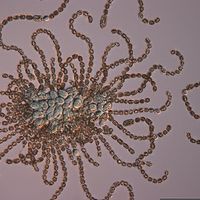Login
Subscribemicrobiology, climate change

Climate Change May Favor Nitrogen-Fixing Plants
Andy Carstens | Oct 17, 2022 | 2 min read
Aridity appears to configure landscapes with a greater diversity of plant species that rely on symbiotic bacteria for nitrogen.

Colin Carlson Works to Predict and Prevent Viral Spillover
Catherine Offord | Jul 18, 2022 | 3 min read
The Georgetown University biologist studies how climate change contributes to the emergence of new zoonotic threats.

Wet Weather Brings Japanese Encephalitis to Australia
Shawna Williams | Apr 14, 2022 | 2 min read
Southern Australia has recorded its first-ever cases of the disease in an outbreak that has so far killed three people.

Seagrasses Continue to Emit Methane Decades After Death
Alejandra Manjarrez, PhD | Feb 22, 2022 | 4 min read
Methane production, likely achieved by a diverse group of methanogenic archaea, occurs at similar rates in both alive and dead seagrasses, a study reports. The findings highlight the potential environmental impact of seagrasses declining globally.

COVID-19 Lockdowns Will Have Negligible Effect on Climate Change
Amanda Heidt | Aug 7, 2020 | 3 min read
A new study finds reductions in greenhouse gases are insufficient to substantially slow warming, and the authors argue that to continue the benefits of reduced emissions, policymakers will need to adopt green economic recovery strategies.

Blue-Green Algae Produce Methane
Ruth Williams | Jan 15, 2020 | 3 min read
Biological production of this greenhouse gas, once thought to be the reserve of anaerobic microbes, occurs in these widespread, photosynthesizing cyanobacteria.

Warming Permafrost Morphs Microbes into Greenhouse Gas Emitters
Ashley Yeager | Nov 1, 2019 | 5 min read
Insulating tundra soil with snow increased the abundance of microbial species involved in carbon dioxide and methane release.

In a Warming Climate, Seaweed’s Microbiome May Mediate Disease
Carolyn Wilke | Jun 1, 2019 | 4 min read
Kelp in warm, acidified waters develop blistered fronds—and the composition of microbial communities could help explain why, a study suggests.

Neslihan Taş Studies Permafrost Microbes as They’re Roused by a Warming Climate
Shawna Williams | Dec 1, 2017 | 3 min read
The Lawrence Berkeley National Laboratory researcher’s work will help predict how the Arctic is responding to climate change—and the global effects of those changes.

Cataloging Fungal Life in Antarctic Seas
Ignacio Amigo | Dec 1, 2017 | 3 min read
Brazilian researchers report a relatively large diversity of fungi in marine ecosystems surrounding Antarctica, but warn that climate change could bring unpleasant surprises.

Warmer Temps Tied to Altered Microbiome in Lizards
Ashley P. Taylor | May 8, 2017 | 3 min read
Bacterial differences after three-month temperature hikes, modeled after global warming predictions, were evident one year later, a study found.

All Together Now
Mary Beth Aberlin | Jan 1, 2016 | 3 min read
Understanding the biological roots of cooperation might help resolve some of the biggest scientific challenges we face.

Week in Review: March 25-29
Jef Akst | Mar 29, 2013 | 3 min read
Microbes affect weight loss; dozens of cancer-linked genes identified; a climate change scientists speaks out about personal attacks; isolation among elderly linked to death
